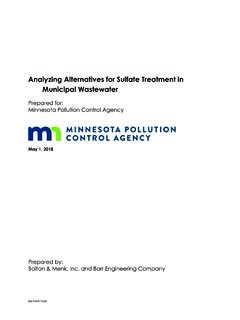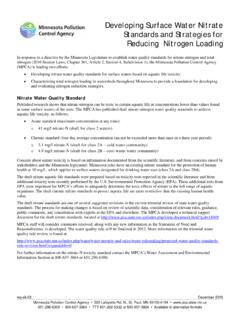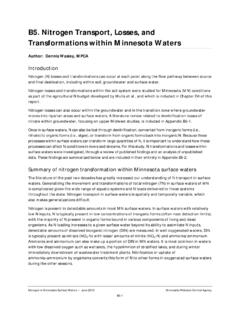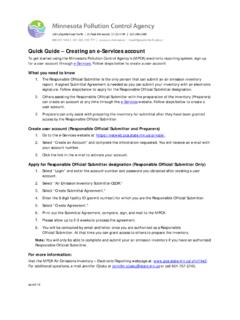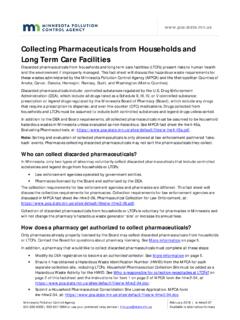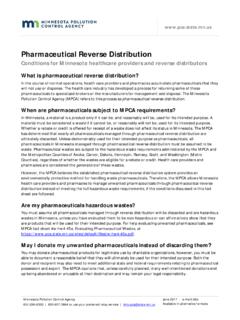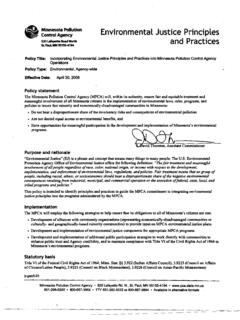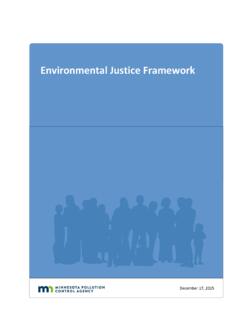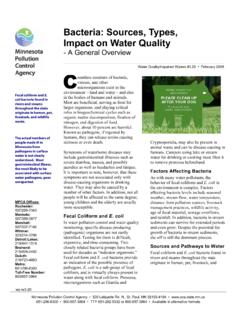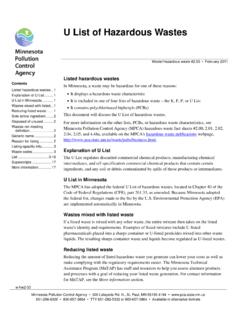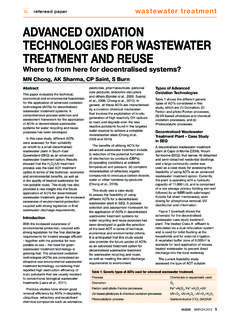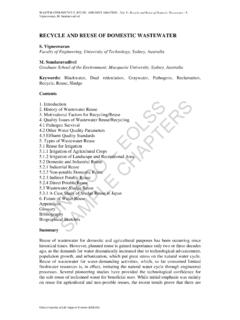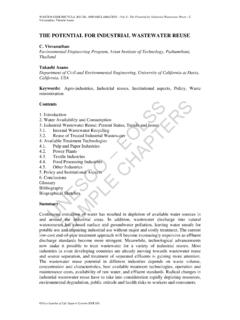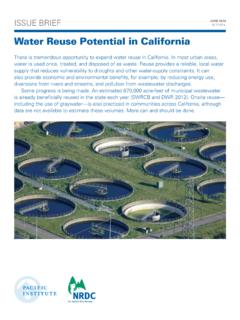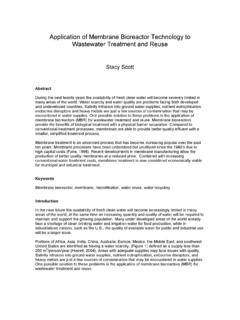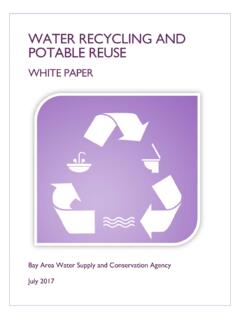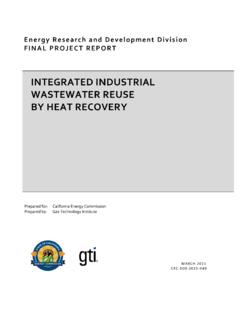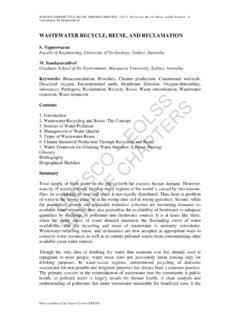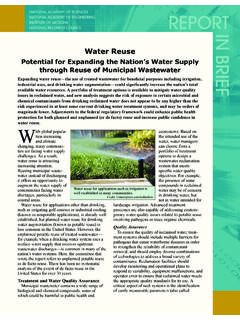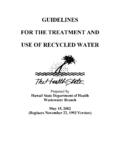Transcription of Municipal Wastewater Reuse
1 Municipal Wastewater Reuse Definition of Municipal Wastewater Reuse , recycling , or Reclamation Wastewater Reuse , recycling , or Reclamation are interchangeable terms commonly used when treated Wastewater effluent is used as a substitute for another source of water. Typically, the recycled Wastewater is used in place of water from a lake, stream, groundwater, or drinking water supply for use in various agricultural, industrial, commercial or Municipal activities. Historical Municipal Wastewater Reuse in Minnesota The Reuse of treated Municipal Wastewater in Minnesota is not new and has been practiced for more than 40 years.
2 The most common Reuse is for irrigation of agricultural crops, grassland, or forests and is commonly referred to as spray irrigation . In 2009, there were approximately 32 Minnesota cities that reused treated effluent for irrigation of this type. More recently, there has been the emergence of recycling Wastewater for golf course irrigation, industrial cooling, and for toilet flushing. Concern is The primary concern with the Reuse of Municipal Wastewater is the protection of public health. Municipal Wastewater contains pathogens and other microorganisms that could cause illness.
3 Therefore, the regulation of Reuse is based on the potential for human exposure with the Wastewater . Reuse activities are categorized based on public access and the risk for the potential for human exposure with the effluent. Treatment limits and types of Reuse Since 1992, the Minnesota Pollution Control Agency (MPCA) has used the State of California Regulations as guidance for the permitting of Wastewater Reuse . California was one of the first states to develop detailed regulations to ensure that the Reuse of Wastewater would be protective of human health.
4 Like Minnesota, many other states have used California regulations as a template for their own requirements. The required level and type of treatment is based on the type of Reuse and establishes the total coliform bacteria that are allowed to be detected in the final treated water. Total coliform is used for the regulation of Wastewater Reuse rather than fecal coliform. A total coliform limit is more restrictive than a fecal coliform limit and is used as an additional safety measure. Treatment design requirements At a minimum, all reused Municipal Wastewater must be treated by a secondary treatment process or its equivalent.
5 The highest level of treatment, disinfection tertiary also requires filtration. The State of California Department of Public Health has published a report titled, Treatment Technology Report for Recycled Water, and lists specific brand name technologies which have been demonstrated to meet the above treatment requirements. These technologies will be allowed with no additional testing required for verification. Other technologies may be allowed but additional justification will be necessary to document the performance capability with respect to the above requirements.
6 A copy of the latest report can be found at the link provided at the end of this factsheet. Storage requirements Municipal facilities that irrigate all of their Wastewater or a large volume of it must have sufficient storage to account for the fact that irrigation during the winter is not allowed in Minnesota. Facilities that propose to irrigate and do not have the ability to discharge elsewhere must have a minimum of 210-days of storage for flow during the period when vegetation is dormant and the ground is frozen. Facilities must also have a Reuse contingency plan to ensure that insufficiently treated Wastewater is not reused.
7 Wq-wwr1-01 March 2010 Minnesota Pollution Control Agency 520 Lafayette Rd. N., St. Paul, MN 55155-4194 651-296-6300 800-657-3864 TTY 651-282-5332 or 800-657-3864 Available in alternative formats Municipal Wastewater Reuse wr-wwr1-01 March 2010 Page 2 of 3 Treatment Limits Types of Reuse Reuse permit limits Minimum level of treatment Food crops where the recycled water contacts the edible portion of the crop, including root crops Irrigation of residential landscape, parks, playgrounds, school yards.
8 Golf courses Toilet flushing Decorative fountains Artificial snow making, structural fire fighting Backfill consolidation around potable water pipe Industrial process water that may come in contact with workers Industrial or commercial cooling or air conditioning involving cooling towers, evaporative condensers, or spray that creates mist MPN/100 ml. Total Coliform 2 NTU daily average; 10 NTU daily maximum turbidity Disinfected Tertiary secondary, filtration, disinfection Cemeteries Roadway landscaping Ornamental nursery stock and sod farms with restricted access Pasture for animals producing milk for human consumption Nonstructural fire fighting Backfill consolidation around nonpotable water pipe Soil compaction, mixing concrete, dust control on roads and streets Cleaning roads, sidewalks.
9 And outdoor work areas Industrial process water that will not come into contact with workers Industrial boiler feed Industrial or commercial cooling or air conditioning not involving cooling towers, evaporative condenser, or spray that creates mist 23 MPN/100 ml. Total Coliform Disinfected Secondary 23 Secondary, disinfection Fodder,fiber, and seed crops Food crops not for direct human consumption Orchards and vineyards with no contact between edible portion Non food bearing trees, such as Christmas trees, nursery stock and sod farms not irrigated less than 14 days before harvest In Minnesota, this is commonly called spray irrigation 200 MPN/100 ml.
10 Fecal Coliform Disinfected secondary 200 Secondary, disinfection (stabilization pond systems with 210 days of storage do not need a separate disinfection process) Municipal Wastewater Reuse wr-wwr1-01 March 2010 Page 3 of 3 Use area restrictions In addition to the treatment requirements for the recycling of Wastewater , the permit will include additional requirements to ensure protection of public health and the environment. All use areas must be posted with signs that state that the water used is recycled, nonpotable, and not fit for consumption.
